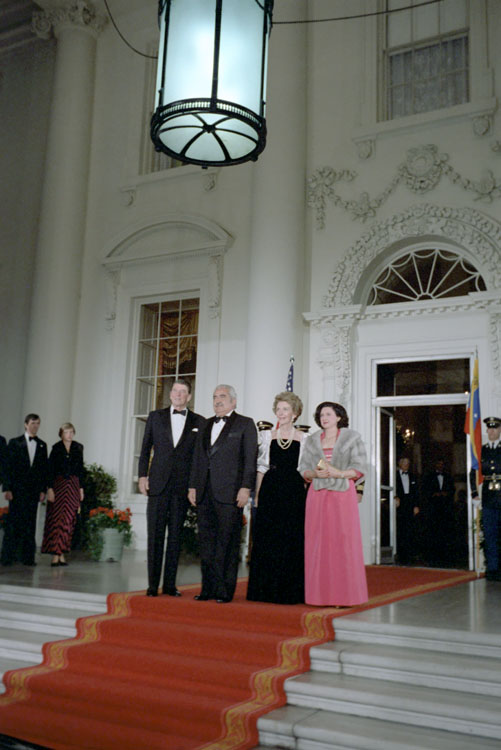Why is Venezuela relevant?



Luis Herrera Campins, and a State dinner at the White House
Since we are in the business of deciphering Venezuela to curious foreigners, I frequently ask myself why there is so much interest in our dysfunctional country. After all, Venezuela is not a particularly important place. From a geopolitical point of view, it’s not as crucial as, say, Egypt or South Korea. It’s not a breeding ground for Islamic terrorists, and it is not a large country like China, Brazil or Indonesia.
True, it’s a major player in the energy business, but a) its role has decreased dramatically; and b) no matter what happens with internal politics, the oil will keep flowing.
So, what gives? Could it be that interest in Venezuela is a bit undeserved?
There are several plausible answers, but I think much of the interest in our national psychodrama has to do with our country’s lost potential.
It’s hard to believe now, but for years Venezuela was held up as a model of a functioning Latin society. Oil wealth created a democratic stability that was sorely missing in many of our neighbors. During the 60s, 70s, and 80s, no major Latin American country had the mix of social peace and seemingly-functional democracy that ours had: not Mexico, not Peru, not Colombia, not Brazil, not Argentina, not Chile, and certainly not Cuba.
Venezuela, thanks to its oil wealth but also to its quasi-visionary leadership, was held up in some quarters as a shining example of the type of politics Latin America could have if it ever got its act together. The fact that political stability coincided with the highest living standards in the continent was icing on the cake.
Venezuela spread the “soft power” that came with its prestige generously. It was famously active in solving the Central American civil wars, promoting the formation of the Contadora Group of Nations that preceded the peace agreements that brought the wars to an end. It also provided political and financial support to struggling democratic movements in the Southern Cone. The idea of using oil wealth to subsidize poor Caribbean nations was also a brainchild of the maligned IVth Republic.
Its relations with less developed nations were always active, in part thanks to hyper-kinetic personalities such as Carlos Andrés Pérez. Let’s recall that Pérez’s second inauguration drew, for good or bad, heads of state from all over the world. Venezuela’s relations with the US were always close, particularly so during the 70s and 80s, with our nation consistently repeating the mantra that it was a “safe provider” of fuel during times of turbulence.
Of course, all that goodwill is gone now. However, for many years Venezuela was viewed in international circles as an “honest broker,” working more on the basis of grand goals than seemingly petty self interest.
Interest in Venezuela is frequently grounded in all the goodwill we generated in the past, and in the lost potential of our country. Let’s not forget we are an untapped market of 30 million consumers – at a time when “multilatinas” are engaged in business deals all over the continent, it seems as though they view Venezuela with the hope that, once we get our act together, there will be interesting business opportunities to be had. And an honorable mention goes to the fact that we are producing much less oil than we really shoud be, given our level of reserves. All of this heightens interest in what happens to us.
But to me, these economic explanations fall a bit short. They do not explain why, for example, leading intellectuals go out of their way to denounce the chavista regime even when there is no obvious economic incentive to do so.
Foreigners are not going to solve our problems. In fact, Venezuelans are entitled to view foreign governments with disdain. We grumble each time they look the other way at the excesses of the Bolivarian revolution in order to sign some juicy agreement with the thugs of Miraflores. And we quietly (and not so quietly) remind them of the amount of goodwill we generated in the past.
The international community appears to be at best indifferent, and at worst complicit, in the Venezuelan tragedy, but that appearance is a bit misleading. Governments and thinkers alike continue to monitor the evolution of the Venezuelan mess to see where it will go. The opposition has many powerful players in its corner.
Just like the election of Hugo Chávez presaged the wave of populism that has since engulfed countries all over the world, so too does the international community appear to hold the hope that the solution will show us the way out of this wave. Let’s just hope the solution comes quickly, and painlessly.
Caracas Chronicles is 100% reader-supported.
We’ve been able to hang on for 22 years in one of the craziest media landscapes in the world. We’ve seen different media outlets in Venezuela (and abroad) closing shop, something we’re looking to avoid at all costs. Your collaboration goes a long way in helping us weather the storm.
Donate




